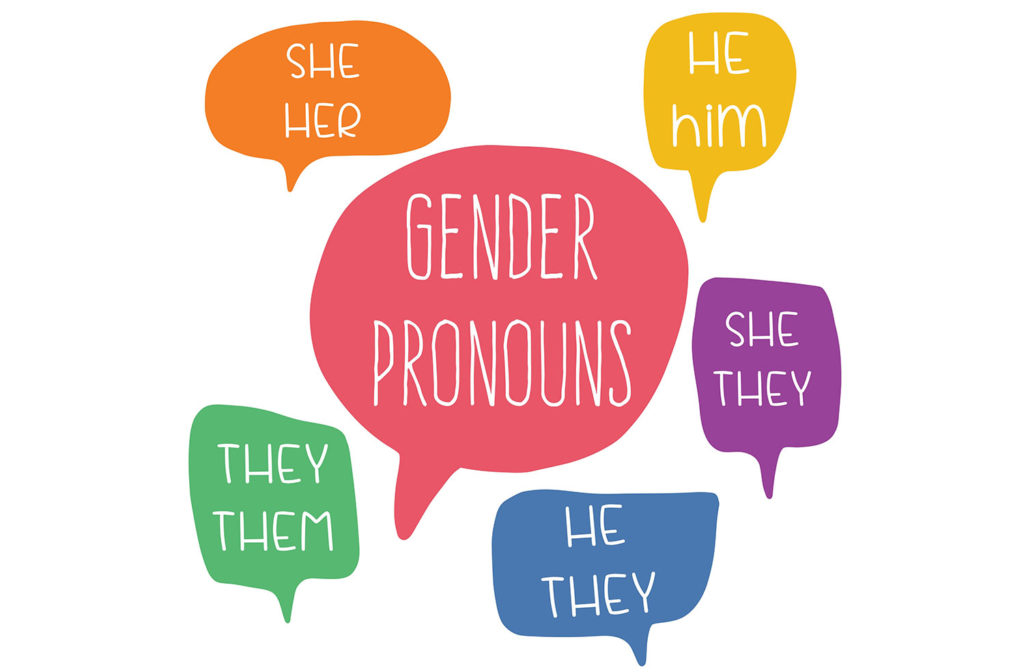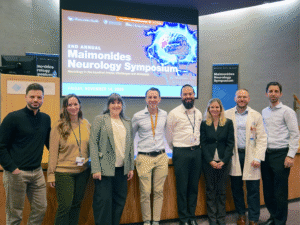Summary
Listening to our children is essential in developing and maintaining a loving and trusting relationship with them and that’s never more true than when a child tells their parent that they are LGBTQIA+. Dr. Carole Filangieri discusses how difficult it can be for children to share this news as well as some tips on how to best respond to your children.
Listen on Spotify Listen on Apple Podcasts Listen on Google Podcasts
Transcript
Scott Webb (Host): Listening to our kids is essential to developing and maintaining a loving and trusting relationship with them. And that’s never more true than when a child tells a parent that they are LGBTQAI+. And joining me today to help parents understand how difficult it is for children to share this news with them and share some tips on how to best respond to our children, is Dr. Carole Filangieri. She’s a Licensed Clinical Psychologist and Director of the Psychology Internship Program at Maimonides. This is Maimo Med Talk. I’m Scott Webb. So Doctor, thanks for joining me today. This is going to be an interesting topic and one that I’m sure parents especially are going to want to listen to. As we get rolling here, though, tell me about yourself. What do you do at Maimonides?
Carole Filangieri, PhD (Guest): I am a Licensed Clinical Psychologist with a sub-specialty in Clinical Neuropsychology. And at Maimonides, I’m the director of the Psychology Internship program. And I do provide outpatient psychotherapy to adult patients as well.
Host: Got it. So great to learn more about you. And as we get rolling here, you know, tell me more or tell me some, at least, about the LGBTQAI+ mental health services at Maimonides.
Dr. Filangieri: So the services that we are engaging in right now include outpatient individual and group therapy for patients who identify as LGBTQAI+ as well as psychiatric medication management for those patients.
Host: Yeah. So good to hear that obviously responding to the needs of the community, making services and counseling available, and you know, I’m a parent myself. So, this is a good question to ask, you know, when a child comes out to their parent, why is it important for the parent to accept that child’s declaration?
Dr. Filangieri: So the obvious reason is because as parents, I’m a parent as well. We love our children unconditionally. You know, and that’s really a full stop. So when our child, if our child comes out to us as trans, it may be a shock. And it’s important to think before saying something that may do more harm than good. For example, you know, asking your child how they know that they’re trans or telling them that they’re too young to know. Or telling them that maybe you’re just gay, you’re not trans. These all invalidate your child’s experience, what they’re going through. And the one thing that we do know from research is that family rejection is the single strongest predictor of suicidality in trans folks.
Host: Yeah. And I’m sure it’s difficult though, for parents, right. You know, this is some pretty jarring news to hear from a child, and I’m sure you have some tips for parents on, you know, let’s maybe dig in a little bit deeper here. What kinds of things can they say? How should they respond? I’m sure it’s better to do more listening than talking, but what kind of tips do you have for parents?
Dr. Filangieri: So the first thing I would suggest to parents is don’t try and play a blame game, right? There’s no fault that your child is trans, or gender non-binary. And one of the things to hold onto is to remember that your child is your child, no matter what they look like on the outside, the core of who they are, will always be the same. And, you know, it’s okay not to understand what your child is going through. It’s going to be a learning process for you, but it’s not okay to prevent them from access to appropriate care.
Host: Yeah, I think you’re so right. And that’s what you were referencing earlier, the care that’s available at Maimonides. And is there a sort of a short list of shoulds and shouldn’ts, or do’s and don’ts and you mentioned there, you touched on this, that it’s really going to be a learning process, right? It’s a learning process for our children who have this news for us, that share this information about themselves with us, their identity, and it’s going to be a learning experience for the parents as well. So is there a list of shoulds and shouldn’ts?
Dr. Filangieri: So one of the first things I would suggest to do use your child’s asserted pronouns and the name that they’ve chosen. And do help them find a provider who’s competent in gender affirming care. One of the don’ts would be, don’t tell your child it’s a phase that they’ll grow out of and don’t refuse to use your child’s asserted pronouns and name. So, those are just a couple of things that, you know, are just right off the top of my head.
Host: Yeah, you’re so right. And I’ve noticed during, you know, work Zooms and things like that, that people have been, you know, putting pronouns with their names and things, and I’m sure that’s difficult at first for parents. Right? But as you say, just initially, listen more than you do. It’s not a phase necessarily. And don’t react that way and just try to do, as we always have as parents try to do what our children are asking us to do, right? Whether we’re buying them things for Christmas or their birthday, or in this case, asking us to you know, to support them to go on this journey with them and to be supportive throughout. And Doctor, are there some resources for parents to help educate them on how they can best support their children?
Dr. Filangieri: When I’ve worked with parents of children who were trans or nonbinary, I have offered two books that I found very helpful. One is called The Transgender Child, a Handbook for Family and Professionals. And the other is called, The Transgender Teen Handbook to support for families and professionals, to support the teen.
So both of those books are readily available and they’re recent publications and they provide a wealth of knowledge. And I do believe they also acknowledge that, you know, the coming out process, isn’t just limited to the individual, the trans individual or the gender non-binary individual, but it’s also a process that the family goes through as well, as they negotiate how they are going to talk to neighbors, teachers, educators, other family members about this change that’s happened in their family.
Host: Yeah, that’s an interesting word, choice, negotiate, and I can really kinda see what you mean there. And when we think about that sort of negotiation, if you will, do you think there’s value in parents speaking with other parents who’ve been through this same situation or on the same journey with their children? And is there support out there for parents of LGBTQAI+ children?
Dr. Filangieri: Absolutely. I think it’s incredibly valuable for parents who are embarking on this journey with their children to talk to other parents at different phases in their journey. One organization that does offer support for parents and families and it’s not just parents, it’s siblings also, is parents, families, and friends of lesbian and gay, bisexual, and transgender people also known as PFLAG and in New York City, there is a trans families project. It’s a support group for parents of transgender children that meets online every Sunday. So, you know, that’s one local resource, but also, parents can find parenting groups, TransParenting groups on Facebook and on other LGBTQ organizations online as well.
Host: Yeah, it does sound like there’s a lot of support out there. And, PFLAG certainly has been doing great work for a long time and great to know that whether it was because of the pandemic or not, that they’re doing things online. So folks can kind of do things from wherever they’re comfortable, presumably their homes, but wherever it is. So, that’s really great. What are your biggest takeaways for listeners today? Whether it’s the parents or the children that might be listening.
Dr. Filangieri: So, you know, for parents it’s to listen to your child and be supportive, ask them what they need from you. And again, don’t play the blame game. There’s no assigning of responsibility here for what’s happened. It’s okay not to really understand, but it’s so important to be accepting.
Host: Yeah, I think you’re so right. This conversation in, in both preparing for the conversation and now speaking with you today, you know, I, I thought a lot about my own children, you know, and just thought about when they’ve asked me for things, when they’ve asked me to support them, when they’ve asked me to just listen to them, don’t judge, don’t offer advice, just listen to me, dad, you know, and I’m sure there’s just a lot of value in that. Just listening and being supportive and not trying to blame them or blame yourselves because there’s just no reason to blame is there? As you said, there’s no reason to play the blame game because there’s nothing wrong. Right? That nobody’s at fault. And maybe you can just speak more to that just from the parent’s perspective. You know, what, what is that instinct that we have with our children? Maybe it’s just, you know, out of love and support that we’ve given them all these years, we always want to try to fix everything. We want to fix their boo-boos. Right. But this isn’t a boo-boo. There’s nothing wrong with them. Right?
Dr. Filangieri: That’s true. And I think, you know, in our overarching culture, gender is such an important thing. If we think about when we are expecting our first child, everybody asks, are you having a girl or a boy before our infant is born, we’re already genderizing them. We’re already painting the room pink or blue if we know what the natal sex of our baby’s going to be. And with that natal sex and how is natal sex determined? The doctors literally just looks between your child’s legs and says you have a boy or girl. Right.
I think based on that, we have all of these preconceptions of what this child will grow into. So when our child comes out and says, well, you know, mom, I don’t feel like I’m a boy or I don’t feel like I’m a girl, all those preconceptions, everything that we’ve thought this child was going to become; it doesn’t mean they’re not going to become somebody spectacular, but they’re not going to look like what we expected them to look like.
And maybe the way that they have children and have a family, isn’t the way we would expect them to. But it doesn’t negate who they are at their core. It doesn’t negate the relationship that you have with them.
Host: Absolutely. I think you’re so right. Lastly, here, Doctor, how can folks make an appointment with you or contact the mental health services at Maimonides?
Dr. Filangieri: So patients who are interested in care can call us at 718-283-2727 to schedule an intake for the LGBTQ clinic. And it happens through what’s called our Rapid Access Clinic. So the patient would come in for an interview and then would go on to receive services through the LGBTQ clinic here.
Host: That’s great. Well, this has been really interesting, really educational today, and I’d love to have a much longer conversation and be able to take phone calls and really dig in here. But this little, bite-sized nugget here, this little podcast, we hope that this helps both parents and children and they reach out if they need support in the services at Maimonides.
Thank you so much Doctor. You stay well.
Dr. Filangieri: Thank you and you too.
Host: To learn more about Maimonides Medical Center, please visit maimo.org. This has been Maimo Med Talk. I’m Scott Webb. Stay well.







